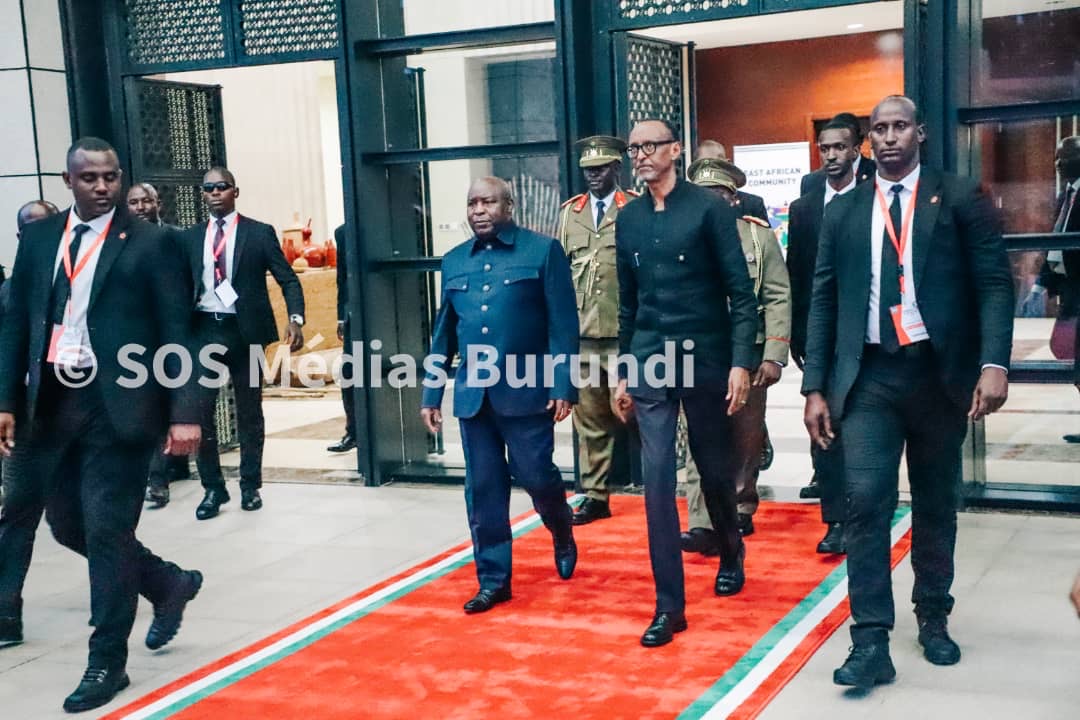Kirundo : meeting between Burundian and Rwandan intelligence, a hope for the reopening of borders

Burundian and Rwandan civil and military intelligence met on Monday in the town center of Kirundo province (northern Burundi), not far from the eastern border of Rwanda. This meeting, which was held behind closed doors, began around 10 a.m. and ended at 4 p.m., according to local sources. This meeting, which follows a first one held in Rwanda two weeks ago, is seen as a glimmer of hope, as sources close to the case say that among the items on the agenda was the question of reopening borders between the two sister nations of the Great Lakes region of Africa, closed since January 2024. INFO SOS Médias Burundi
The meeting took place at the « Royal North Hotel », located in the Rupfunda district in the provincial town center, along the road leading to Rwanda.
“All along the road leading to the meeting place, access was blocked, while soldiers and police from both countries ensured the security of the event,” Kirundo residents who were unable to approach to see the Burundian and Rwandan intelligence officials who were present at the meeting told SOS Médias Burundi.
A major issue : the reopening of the borders
According to various sources, this meeting brought together chiefs of the national intelligence services of Rwanda and Burundi, as well as intelligence officials within the defense forces of the two nations. The main objective of this meeting was to find a solution to reopen the borders, closed on the Burundian side since January 2024, with Burundian authorities accusing Rwanda of maintaining armed groups that want to destabilize the Burundian territory.
Burundi insists on the repatriation of the 2015 putschists, exiled in Rwanda after their attempted coup d’état in Spring 2015. This demand, already expressed by former President Pierre Nkurunziza and taken up by his successor Évariste Ndayishimiye since his early accession to power in June 2020 following the unexpected death of Nkurunziza, has remained unanswered, fueling persistent tensions between the two countries.
Strong expectations from the population
Inhabitants of Kirundo province, informed of the holding of this meeting, hope for a favorable outcome. The majority of those who spoke to SOS Médias Burundi, want the borders to reopen, in particular to facilitate trade and travel.
This meeting, which follows a first one held in Rwanda two weeks ago, is seen as a glimmer of hope.
Mutual accusations between Kigali and Gitega
In addition to the tensions linked to the attempted coup d’état in 2015, Rwanda accuses Burundi of facilitating the entry of fighters from the Democratic Forces for the Liberation of Rwanda (FDLR) into its territory, including within the Burundian police and army.
According to Kigali, these groups are preparing for an offensive against Rwanda with the aim of forcing them to return. Recently, Rwandan President Paul Kagame has accused the Burundian army of collaborating with the Hutu-FDLR genocidaires in the war against the M23, an armed group that defends the rights of Tutsis in the DRC (Democratic Republic of Congo). The latter receives support from Rwanda, according to UN experts that the Rwandan government describes as « liars ».
Burundi has sent 10,000 soldiers to support the FARDC (Armed Forces of the Democratic Republic of Congo) and their allied militias in the war against the M23, which now controls the provincial capitals of North Kivu and South Kivu in eastern Congo and the borders with Uganda, Rwanda and Burundi.
In late February, Burundian President Évariste Ndayishimiye told diplomats in the political capital Gitega that « the resolution of the Congolese crisis will require the withdrawal of all uninvited foreign armed forces » and « the dismantling of all foreign and local armed groups, including the FDLR. » A few days earlier, he had accused his Rwandan counterpart Paul Kagame of « destabilizing the region and planning military attacks against Burundi, » in a separate meeting with diplomats in the commercial city of Bujumbura, where UN agencies and the central administration are concentrated.
Towards a normalization of relations
While tensions persist, this meeting could mark a turning point in cooperation between the two sister nations of the Great Lakes region of Africa.
Their populations are eagerly awaiting the outcome of this dialogue, hoping that it will ease tensions and reopen borders to promote economic and human relations between these two neighboring countries.

